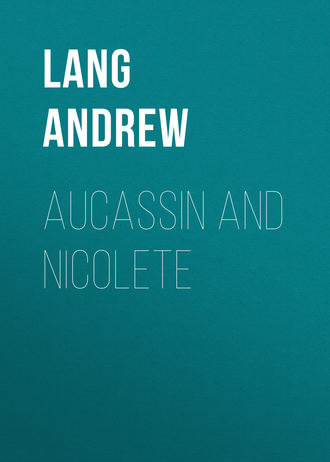
Lang Andrew
Aucassin and Nicolete
BALLADE OF AUCASSIN
Where smooth the Southern waters run
Through rustling leagues of poplars gray,
Beneath a veiled soft Southern sun,
We wandered out of Yesterday;
Went Maying in that ancient May
Whose fallen flowers are fragrant yet,
And lingered by the fountain spray
With Aucassin and Nicolete.
The grassgrown paths are trod of none
Where through the woods they went astray;
The spider’s traceries are spun
Across the darkling forest way;
There come no Knights that ride to slay,
No Pilgrims through the grasses wet,
No shepherd lads that sang their say
With Aucassin and Nicolete.
’Twas here by Nicolete begun
Her lodge of boughs and blossoms gay;
’Scaped from the cell of marble dun
’Twas here the lover found the Fay;
O lovers fond, O foolish play!
How hard we find it to forget,
Who fain would dwell with them as they,
With Aucassin and Nicolete.
ENVOY.
Prince, ’tis a melancholy lay!
For Youth, for Life we both regret:
How fair they seem; how far away,
With Aucassin and Nicolete.
A. L.
BALLADE OF NICOLETE
All bathed in pearl and amber light
She rose to fling the lattice wide,
And leaned into the fragrant night,
Where brown birds sang of summertide;
(’Twas Love’s own voice that called and cried)
“Ah, Sweet!” she said, “I’ll seek thee yet,
Though thorniest pathways should betide
The fair white feet of Nicolete.”
They slept, who would have stayed her flight;
(Full fain were they the maid had died!)
She dropped adown her prison’s height
On strands of linen featly tied.
And so she passed the garden-side
With loose-leaved roses sweetly set,
And dainty daisies, dark beside
The fair white feet of Nicolete!
Her lover lay in evil plight
(So many lovers yet abide!)
I would my tongue could praise aright
Her name, that should be glorified.
Those lovers now, whom foes divide
A little weep, – and soon forget.
How far from these faint lovers glide
The fair white feet of Nicolete.
ENVOY.
My Princess, doff thy frozen pride,
Nor scorn to pay Love’s golden debt,
Through his dim woodland take for guide
The fair white feet of Nicolete.
GRAHAM R. TOMSON
THE SONG-STORY OF AUCASSIN AND NICOLETE
’Tis of Aucassin and Nicolete.
Who would list to the good lay
Gladness of the captive grey?
’Tis how two young lovers met,
Aucassin and Nicolete,
Of the pains the lover bore
And the sorrows he outwore,
For the goodness and the grace,
Of his love, so fair of face.
Sweet the song, the story sweet,
There is no man hearkens it,
No man living ’neath the sun,
So outwearied, so foredone,
Sick and woful, worn and sad,
But is healèd, but is glad
’Tis so sweet.
So say they, speak they, tell they the Tale:
How the Count Bougars de Valence made war on Count Garin de Biaucaire, war so great, and so marvellous, and so mortal that never a day dawned but alway he was there, by the gates and walls, and barriers of the town with a hundred knights, and ten thousand men at arms, horsemen and footmen: so burned he the Count’s land, and spoiled his country, and slew his men. Now the Count Garin de Biaucaire was old and frail, and his good days were gone over. No heir had he, neither son nor daughter, save one young man only; such an one as I shall tell you. Aucassin was the name of the damoiseau: fair was he, goodly, and great, and featly fashioned of his body, and limbs. His hair was yellow, in little curls, his eyes blue and laughing, his face beautiful and shapely, his nose high and well set, and so richly seen was he in all things good, that in him was none evil at all. But so suddenly overtaken was he of Love, who is a great master, that he would not, of his will, be dubbed knight, nor take arms, nor follow tourneys, nor do whatsoever him beseemed. Therefore his father and mother said to him;
“Son, go take thine arms, mount thy horse, and hold thy land, and help thy men, for if they see thee among them, more stoutly will they keep in battle their lives, and lands, and thine, and mine.”
“Father,” said Aucassin, “I marvel that you will be speaking. Never may God give me aught of my desire if I be made knight, or mount my horse, or face stour and battle wherein knights smite and are smitten again, unless thou give me Nicolete, my true love, that I love so well.”
“Son,” said the father, “this may not be. Let Nicolete go, a slave girl she is, out of a strange land, and the captain of this town bought her of the Saracens, and carried her hither, and hath reared her and let christen the maid, and took her for his daughter in God, and one day will find a young man for her, to win her bread honourably. Herein hast thou naught to make or mend, but if a wife thou wilt have, I will give thee the daughter of a King, or a Count. There is no man so rich in France, but if thou desire his daughter, thou shalt have her.”
“Faith! my father,” said Aucassin, “tell me where is the place so high in all the world, that Nicolete, my sweet lady and love, would not grace it well? If she were Empress of Constantinople or of Germany, or Queen of France or England, it were little enough for her; so gentle is she and courteous, and debonaire, and compact of all good qualities.”
Here singeth one:
Aucassin was of Biaucaire
Of a goodly castle there,
But from Nicolete the fair
None might win his heart away
Though his father, many a day,
And his mother said him nay,
“Ha! fond child, what wouldest thou?
Nicolete is glad enow!
Was from Carthage cast away,
Paynims sold her on a day!
Wouldst thou win a lady fair
Choose a maid of high degree
Such an one is meet for thee.”
“Nay of these I have no care,
Nicolete is debonaire,
Her body sweet and the face of her
Take my heart as in a snare,
Loyal love is but her share
That is so sweet.”
Then speak they, say they, tell they the Tale:
When the Count Garin de Biaucaire knew that he would avail not to withdraw Aucassin his son from the love of Nicolete, he went to the Captain of the city, who was his man, and spake to him, saying:
“Sir Count; away with Nicolete thy daughter in God; cursed be the land whence she was brought into this country, for by reason of her do I lose Aucassin, that will neither be dubbed knight, nor do aught of the things that fall to him to be done. And wit ye well,” he said, “that if I might have her at my will, I would burn her in a fire, and yourself might well be sore adread.”
“Sir,” said the Captain, “this is grievous to me that he comes and goes and hath speech with her. I had bought the maiden at mine own charges, and nourished her, and baptized, and made her my daughter in God. Yea, I would have given her to a young man that should win her bread honourably. With this had Aucassin thy son naught to make or mend. But, sith it is thy will and thy pleasure, I will send her into that land and that country where never will he see her with his eyes.”
“Have a heed to thyself,” said the Count Garin, “thence might great evil come on thee.”
So parted they each from other. Now the Captain was a right rich man: so had he a rich palace with a garden in face of it; in an upper chamber thereof he let place Nicolete, with one old woman to keep her company, and in that chamber put bread and meat and wine and such things as were needful. Then he let seal the door, that none might come in or go forth, save that there was one window, over against the garden, and strait enough, where through came to them a little air.
Here singeth one:
Nicolete as ye heard tell
Prisoned is within a cell
That is painted wondrously
With colours of a far countrie,
And the window of marble wrought,
There the maiden stood in thought,
With straight brows and yellow hair
Never saw ye fairer fair!
On the wood she gazed below,
And she saw the roses blow,
Heard the birds sing loud and low,
Therefore spoke she wofully:
“Ah me, wherefore do I lie
Here in prison wrongfully:
Aucassin, my love, my knight,
Am I not thy heart’s delight,
Thou that lovest me aright!
’Tis for thee that I must dwell
In the vaulted chamber cell,
Hard beset and all alone!
By our Lady Mary’s Son
Here no longer will I wonn,
If I may flee!
Then speak they, say they, tell they the Tale:
Nicolete was in prison, as ye have heard soothly, in the chamber. And the noise and bruit of it went through all the country and all the land, how that Nicolete was lost. Some said she had fled the country, and some that the Count Garin de Biaucaire had let slay her. Whosoever had joy thereof, Aucassin had none, so he went to the Captain of the town and spoke to him, saying:
“Sir Captain, what hast thou made of Nicolete, my sweet lady and love, the thing that best I love in all the world? Hast thou carried her off or ravished her away from me? Know well that if I die of it, the price shall be demanded of thee, and that will be well done, for it shall be even as if thou hadst slain me with thy two hands, for thou hast taken from me the thing that in this world I loved the best.”
“Fair Sir,” said the Captain, “let these things be. Nicolete is a captive that I did bring from a strange country. Yea, I bought her at my own charges of the Saracens, and I bred her up and baptized her, and made her my daughter in God. And I have cherished her, and one of these days I would have given her a young man, to win her bread honourably. With this hast thou naught to make, but do thou take the daughter of a King or a Count. Nay more, what wouldst thou deem thee to have gained, hadst thou made her thy leman, and taken her to thy bed? Plentiful lack of comfort hadst thou got thereby, for in Hell would thy soul have lain while the world endures, and into Paradise wouldst thou have entered never.”
“In Paradise what have I to win? Therein I seek not to enter, but only to have Nicolete, my sweet lady that I love so well. For into Paradise go none but such folk as I shall tell thee now: Thither go these same old priests, and halt old men and maimed, who all day and night cower continually before the altars, and in the crypts; and such folk as wear old amices and old clouted frocks, and naked folk and shoeless, and covered with sores, perishing of hunger and thirst, and of cold, and of little ease. These be they that go into Paradise, with them have I naught to make. But into Hell would I fain go; for into Hell fare the goodly clerks, and goodly knights that fall in tourneys and great wars, and stout men at arms, and all men noble. With these would I liefly go. And thither pass the sweet ladies and courteous that have two lovers, or three, and their lords also thereto. Thither goes the gold, and the silver, and cloth of vair, and cloth of gris, and harpers, and makers, and the prince of this world. With these I would gladly go, let me but have with me, Nicolete, my sweetest lady.”
“Certes,” quoth the Captain, “in vain wilt thou speak thereof, for never shalt thou see her; and if thou hadst word with her, and thy father knew it, he would let burn in a fire both her and me, and thyself might well be sore adread.”
“That is even what irketh me,” quoth Aucassin. So he went from the Captain sorrowing.
Here singeth one:
Aucassin did so depart
Much in dole and heavy at heart
For his love so bright and dear,
None might bring him any cheer,
None might give good words to hear,
To the palace doth he fare
Climbeth up the palace-stair,
Passeth to a chamber there,
Thus great sorrow doth he bear,
For his lady and love so fair.
“Nicolete how fair art thou,
Sweet thy foot-fall, sweet thine eyes,
Sweet the mirth of thy replies,
Sweet thy laughter, sweet thy face,
Sweet thy lips and sweet thy brow,
And the touch of thine embrace,
All for thee I sorrow now,
Captive in an evil place,
Whence I ne’er may go my ways
Sister, sweet friend!”
So say they, speak they, tell they the Tale:
While Aucassin was in the chamber sorrowing for Nicolete his love, even then the Count Bougars de Valence, that had his war to wage, forgat it no whit, but had called up his horsemen and his footmen, so made he for the castle to storm it. And the cry of battle arose, and the din, and knights and men at arms busked them, and ran to walls and gates to hold the keep. And the towns-folk mounted to the battlements, and cast down bolts and pikes. Then while the assault was great, and even at its height, the Count Garin de Biaucaire came into the chamber where Aucassin was making lament, sorrowing for Nicolete, his sweet lady that he loved so well.
“Ha! son,” quoth he, “how caitiff art thou, and cowardly, that canst see men assail thy goodliest castle and strongest. Know thou that if thou lose it, thou losest all. Son, go to, take arms, and mount thy horse, and defend thy land, and help thy men, and fare into the stour. Thou needst not smite nor be smitten. If they do but see thee among them, better will they guard their substance, and their lives, and thy land and mine. And thou art so great, and hardy of thy hands, that well mightst thou do this thing, and to do it is thy devoir.”
“Father,” said Aucassin, “what is this thou sayest now? God grant me never aught of my desire, if I be dubbed knight, or mount steed, or go into the stour where knights do smite and are smitten, if thou givest me not Nicolete, my sweet lady, whom I love so well.”
“Son,” quoth his father, “this may never be: rather would I be quite disinherited and lose all that is mine, than that thou shouldst have her to thy wife, or to love par amours.”
So he turned him about. But when Aucassin saw him going he called to him again, saying,
“Father, go to now, I will make with thee fair covenant.”
“What covenant, fair son?”
“I will take up arms, and go into the stour, on this covenant, that, if God bring me back sound and safe, thou wilt let me see Nicolete my sweet lady, even so long that I may have of her two words or three, and one kiss.”





